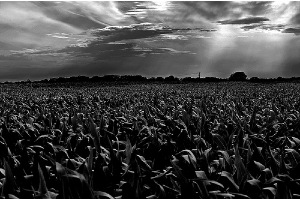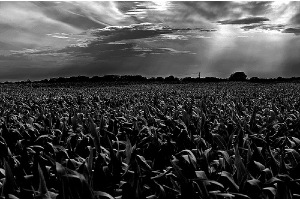 Field of screamsIn a glowing Atlantic profile back in 1997, Greg Easterbrook declared Norman Borlaug the “Forgotten Benefactor of Humanity.” Borlaug is the intellectual father of what became known as the “Green Revolution,” the concerted effort by the U.S. government, leading foundations, and large agribusinesses in the 1960s and ’70s to deliver the gift of industrial agriculture to the global south.
Field of screamsIn a glowing Atlantic profile back in 1997, Greg Easterbrook declared Norman Borlaug the “Forgotten Benefactor of Humanity.” Borlaug is the intellectual father of what became known as the “Green Revolution,” the concerted effort by the U.S. government, leading foundations, and large agribusinesses in the 1960s and ’70s to deliver the gift of industrial agriculture to the global south.
With Borlaug cheering them on and the Ford and MacArthur Foundation providing cash, farmers in the fertile Punjab state — the subcontinent’s answer to our midwest — state turned shunned traditional crops and turned to high-yielding strains of wheat — which required steady irrigation and heavy doses of imported synthetic fertilizer and pesticide. Grain yields boomed, and the famines that had been haunting India since the time of British rule receded.
In his Atlantic piece, Easterbrook declares India’s wheat boom Borlaug’s “majestic achievement.” In the years since, his stature has only grown. When the great main turned 95 three weeks ago, praise rained down, particularly from the right. In the blog of libertarian Reason Magazine, science correspondent Ronald Bailey declared Borluag “One of the true giants of our time … the person who has saved more human lives than anyone in history.” Just last week, the 95-year-old Borlaug published an op-ed in the Washington Times co-written with Sen. Richard Lugar (R.-Indiana), calling for a “new green revolution,” this one adding patent-protected genetically modified seeds to the old mix of irrigation, synthetic fertilizer, and pesticides. The piece promotes the the Lugar-Casey Global Food Security Act, which was recently approved by the Senate Foreign Relations Committee and is under consideration in the full Senate. The bill would make launching a “second green revolution” official U.S. development policy in Africa.
While Borlaug basks in adulation and contemplates making new continents safe for Monsanto and other agribiz giants, the first Green Revolution is turning out to be an unmitigated disaster.
Check out these two excellent recent NPR reports (here and here). In the roughly one generation since Green Revolution techniques took hold in India’s Punjab, farmers in the region have succeeded in tapping out its groundwater with irrigation schemes and ruining its once-fertile soil. Activists like Vandana Shiva have been making this point for years; now, as NPR reports, the government is acknowledging the calamity. The farmers, for their part, are in despair — wracked by falling yields, crushing debt, and spending more and more to pump less and less water out of the ground. Government officials are talking openly about agricultural “collapse” … in the breadbasket of the world’s second most populous nation.



